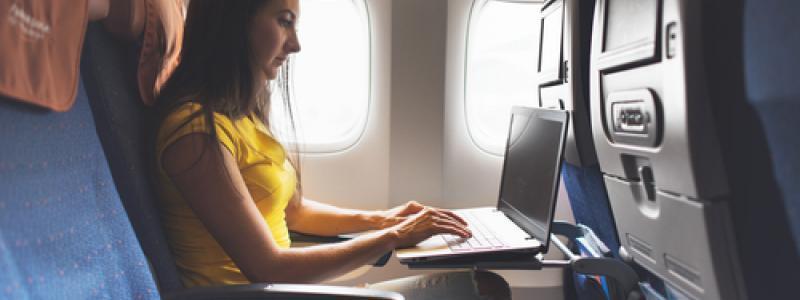DHS Ends Ban On Laptops On All Aircraft Flying From Middle East

The United States government has officially ended a ban which disallowed laptop devices and other big electrical gadgets to be carried on commercial flights coming from a total of ten countries in the Middle East, as well as flights from nine different airline companies. According to a tweet posted by the US Department of Homeland Security, the lifting of the ban will transition with the adoption of more strict security measures. The agency, however, did not reveal just yet what these enhanced security measures will involve.
The so-called laptop ban was began back in March early this year, and was implemented as a response to intelligence reports indicating the increased likelihood of terror attacks happening in America. In issuing the ban about four months ago, the Department of Homeland Security had applied to every flight bound for the US from ten Middle Eastern countries, which include Abu Dhabi and Dubai of the United Arab Emirates, Egypt, Jordan, Kuwait, Morocco, Qatar, Saudi Arabia, Lebanon, Tunisia, and Turkey. As for the nine airline companies, the full list had included the following:
-
Royal Jordanian
-
Egypt Air
-
Turkish Airlines
-
Saudi Arabian Airlines
-
Kuwait Airways
-
Royal Air Maroc
-
Qatar Airways
-
Emirates
-
Etihad
Less than a month ago, the Department of Homeland Security had announced that it will not be expanding the scope of the laptop ban. It revealed that what it will be doing instead is to introduce tighter security measures, not only for all aircraft coming to the US, but also in all airports in the country.
Although the Department of Homeland Security is yet to announce what these tighter security measures will be, some are saying that it will likely involve the improvement of the screening process with regards to individual flight passengers, adopting heightened examination of personal electronic devices, tightening security measures around aircraft and passenger areas, and finally, making full use of advanced technology, boosting canine inspections, and adding extra pre-clearance areas.
When the ban was first introduced, it applied to all laptops, tablet devices, and other electronic gadgets larger than the size of a smartphone. The ban had effectively restricted these items from being carried inside the cabins of commercial flights. About a couple of months ago, the Department of Homeland Security had even seriously considered implementing the ban for commercial flights coming from Europe. Naturally, European officials and airline companies were not too happy with the news. They contended that if a ban were to be implemented for European flights, approximately 65 million passengers would have been severely inconvenienced.
Related Blog Articles
- Sprint Opens Twice The Price Store To Troll Verizon
- Survey: Teenagers Mostly Experience Online Hate Via Instagram, Facebook
- Netflix Is Top Moneymaking App During Second Quarter Of 2017
- Introducing The Unlimited WiFi Plan: A Global WiFi Offering From US Mobile
- Australian Company Partners With Apple For First Made For iPhone Hearing Implant
- WhatsApp Now Has 1 Billion Daily Users
- Honolulu Becomes First Major City In US To Ban Mobile Use At Crosswalks
- Spotify Now Has 60 Million Paying Subscribers
- Singapore Survey: Consumers Won’t Last A Day Without Mobile Data
- Google Play To Rank Mobile Apps With Better Quality Higher
Related Blog Posts
- Report: Drug users are using wearable devices during binges
- Spotify allows Android users to reorder playlists; Pandora lets users share tunes to Snapchat Stories
- WhatsApp combats fake news with a new forwarded label
- FCC: Today’s improving mobile networks can impact healthcare costs
- Did Apple Music already overtake Spotify in America?


 Menu
Menu